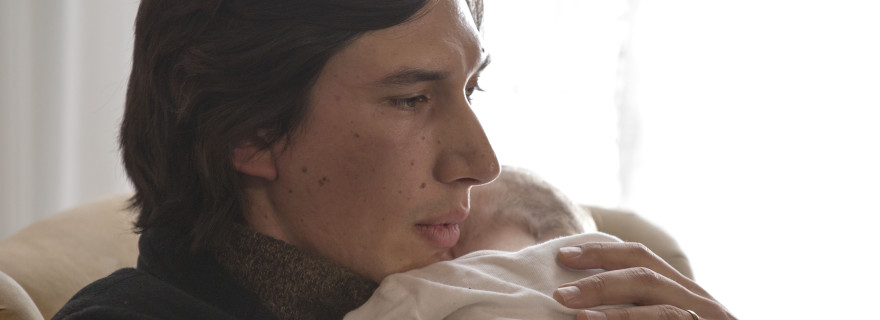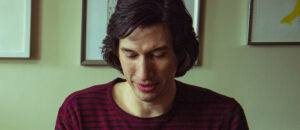'Hungry Hearts'
Movie Rating:
3.5
A truly bizarre little movie in all the best possible ways, ‘Hungry Hearts’ plays best with zero expectations or any preconceived notions. Unfortunately, that’s not really how movie reviews work. If you’re intrigued at all by the film and already feel inclined to see it, stop reading and go forth now. If you want to know more, well then stick with me.
Adam Driver (‘Girls’) and Alba Rohrwacher (‘The Wonders‘) open the film with what can only be described as a “meet gross” scenario. In a single static shot, the duo get locked together in a restaurant bathroom that Driver has stunk up something fierce. By the end of the ordeal, they appear to be crazy for each other. The film keeps on this vaguely mumblecore track for a little while. Scenes slide together through big gaps in time showing the couple form and have a child. Throughout, we get fleeting suggestions that Rohrwacher might have a few cracks in her psyche, but nothing that gives any indication of what’s to come.
Once her child is in her arms, Rohrwacher’s maternal instincts kick in to a psychotic degree. She becomes obsessively overprotective of the infant, unwilling to take the child outside or even feed him properly, fearing poisonous influences. At first, this is merely irritating for Driver, but gradually it spirals out of control and he has to forcibly take his own child to visit doctors and childcare workers. Eventually, a full-on kidnapping might be necessary for the good of the kid, even though that likely won’t go over to well with mama.
Italian director Saverio Costanzo’s strange and disturbing genre bender thrives on the uncomfortably unexpected. As he sets the scene through charming banter and observational romanticism, the movie seems to be on a very clear path. Then darkness creeps in around the edges, along with a sense of impending doom. As Rohrwacher’s disturbingly overbearing motherhood begins to hear its ugly head, the comedy vanishes and the handheld cinematography that once seemed fleeting becomes a tool to capture harshly real drama.
Then, at a certain point, the movie transforms into an almost Polanski-like paranoid thriller, complete with that director’s trademark use of disorienting wide angle lenses in confined spaces. The approach works because the way in which Costanzo distorts a natural mother’s love into something nightmarish transcends the realism necessary to pull the audience into the story initially. It’s certainly a drastic leap from where the story began, yet one that Costanzo slides into so gradually that it feels natural to the piece. Although certain leaps in logic necessary for narrative momentum will irk some viewers (at one point, a lawyer essentially advises Driver to kidnap his own child, which is absurd), thankfully no shark is jumped on the director’s slow grind toward a nasty little twist ending which suggests that the filmmaker has serious mommy issues.
The major reason why all the tonal and genre shifts in ‘Hungry Hearts’ don’t completely derail the movie are the impressive central performances from Adam Driver and Alba Rohrwacher (who deservingly claimed Best Actor and Best Actress prizes at the Venice Film Festival). Their work is truly impressive, opening quietly comedic and gradually unraveling into psychological trauma. Rohrwacher likely has the more difficult role in a mostly silent turn that needs to become psychotic without ever fully losing audience empathy. (She does so beautifully.) Meanwhile, Driver starts off as his usual charmingly aloof self before turning into a pained and paranoid obsessive. He pulls off that transition with enough ease to suggest that he has a long and fruitful career ahead of him.
The lead duo ground the movie in a way that’s absolutely necessary for Costanzo to pull off his twisted genre games. As wild of a ride as ‘Hungry Hearts’ can be for audiences, it’s likely best appreciated as a difficult dance between three artistic partners who are perfectly in sync. The film is too weird and unsettling for mass consumption, but those with a sweet tooth for the off-kilter and the oddball should seek it out immediately. There’s certainly nothing else like it on screens right now. Not even close.




itjustWoRX
Adam Driver is the only good thing to come out of HBO’s “Girls.”
Julian
Isn’t it funny how we now refer to “Adam Driver (‘Girls’)”, but come December (and, probably, for the rest of his life) it will be “Adam Driver (Star Wars)”?